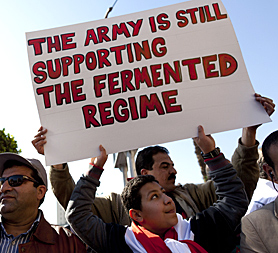Egypt: two die as protesters target army
Two men die and 15 are injured as protests flare up in Tahrir Square amid calls for the army to pass its leadership to the civilian population. Channel 4 News hears powerful allegations of army abuse.

Protesters last night defied the Egyptian army’s attempt to clear them from Cairo’s central square, standing firm today to demand that the former President Hosni Mubarak stands trial.
The army, which has held power since Mr Mubarak’s downfall, has become a growing target for hardline protesters who say the leadership is colluding with Mr Mubarak’s old network.
The army dismisses these allegations and has insisted that it is guarding against any attempt by former officials to undermine the reform movement.
Medical sources said two men died of gunshot wounds after the army moved to clar Tahrir during the curfew in the early hours of this morning.
Troops and police used tasers and batons. But the army claims it had only fired blank rounds in the air to scare protesters, and that its operation had caused no deaths.
However today, several protesters said some of their number were injured and killed in the clashes. One pointed to a pool of blood in the square.
Egypt: after the revolution, allegations of military abuse
Two months on from the revolution, Channel 4 News's John Sparks hears powerful allegations of torture, arbitrary detention and sham trials by the Egyptian armed forces once hailed as heroes.
On January 31, six days into Egypt's popular uprising, the Egyptian armed forces made a series of critical undertakings.
A stiff-looking army spokesman stood in front of the camera and said the army "would not to fire on protesters". He described the protesters demands as "legitimate" and said "freedom of expression through peaceful means is guaranteed to everybody."
Read more: After the revolution, allegations of military abuse
Protester Abdullah Ahmed, 45, said: “The military council is part and parcel of the corrupt regime. It is made up of heads of the army that have benefited from Mubarak and his 30 years of robbing the Egyptian people.”
“Thank God, we resisted them (the army), and we are still here,” said one protester in Tahrir, which was the epicentre of demonstrations that pushed Mr Mubarak out.
Hundreds were still in Tahrir by early on Saturday morning. Those numbers rose to more than 2,000 later in the day.”Why is the army beating us? Why is the army firing at us?” protesters chanted overnight when the army moved in, a witness reported.
Some protesters want the ruling Supreme Council of the Armed Forces to hand power to a civilian council and have called for the resignation of Field Marshal Mohamed Hussein Tantawi, who heads the army council. He has stayed on as defence minister after serving for two decades in that post under Mr Mubarak.
“Either Field Marshal Tantawi puts these people – Mubarak, Gamal (his son), and the others – on trial, or he leaves his post and lets someone else do it.
The slowness of the process makes people suspicious that the army (leadership) might be implicated,” said Ashraf Abdel-Aziz, 36, a shop owner.
In scenes reminiscent of the height of protests against Mr Mubarak, three burned out army vehicles were left in the square. Some protesters, angry at the army’s tactics, hurled rocks at the smouldering hulk of one of the army trucks.